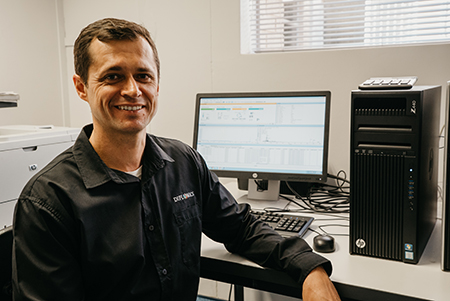Diagnosing a rare disease soon after birth can, for some, mean the difference between life and death in the long run.
The Centre for Human Metabolomics (CHM) on the North-West University’s (NWU’s) campus in Potchefstroom, together with a leading American biotechnology company, has developed a diagnostic test that drastically cuts the time it takes to receive test results for lysosomal storage disorders (LSDs)*.
Diagnostic testing for six rare diseases was previously only performed at European and American laboratories and it took as long as six to eight weeks to get results. Using a single dried blood spot sample, the CHM Laboratory in Potchefstroom and its partner, Sanofi Genzyme, can now have test results available within two weeks. What’s more, the testing is done in South Africa.
LSDs affect many children
LSDs comprise about 50 genetic disorders and almost 80% of patients diagnosed are children (although the number of adult patients referred has also been increasing steadily). The six rare diseases include Gaucher, Niemann-Pick A/B, Pompe, Fabry, MPS I and Krabbe disease.
These conditions are caused mainly by mutations in gene-encoding enzymes, which are involved in the lysosomal degradation of intermediate metabolites. The progressive accumulation of these metabolic products may cause tissue and organ dysfunction and premature death. The effects are devastating. Those who do not receive treatment may not live to see their fifth birthday.
Mutual benefits spur capacity building
The partnership, which has developed over the past two years, is beneficial for both the CHM and Sanofi Genzyme. Sanofi Genzyme provides enzyme therapy for the six rare diseases but this can only start after a patient has been diagnosed.
It also provides funding to help build capacity and infrastructure at the CHM, which in turn does the testing that identifies the patients in need of treatment.
CHM is a leader in the field
CHM has a strong heritage and an excellent track record in the diagnosis of genetic disorders, with 30 years’ experience in basic testing and diagnostic services for LSDs. The local testing initiative with Sanofi Genzyme began in 2017.
“I think CHM is an excellent example of how a university can function through interaction with the community. All the work we do is funded through the income we generate from our diagnostic services and partnerships, such as the one we have with Sanofi Genzyme. Many of the university’s goals in terms of students, research and publications are met through these funds,” says Prof Chris Vorster, Director and chemical pathologist at CHM.
For more information about the diagnostic testing, visit https://youtu.be/MXzt01JqXXU, phone Ansie Mienie at 018 285 2544 or Grant Maasdorp at 018 285 2541, and to learn more about the CHM visit http://natural-sciences.nwu.ac.za/human-metabolomics.
*Lysosomal storage diseases are defined by the National Organization for Rare Disorders as metabolic diseases that are characterized by an abnormal build-up of various toxic materials in a body’s cells as a result of enzyme deficiencies.

Prof Chris Vorster, director and Chemical Pathologist of the Centre for Human Metabolomics, says their diagnostic services make a valuable contribution to the South African community. We owe a lot to the contributions from researchers such as Prof Japie Mienie (founder member of the Potchefstroom Laboratory for Inherited Metabolic Disorders). Without their contributions, the labs would not be what they are today.
